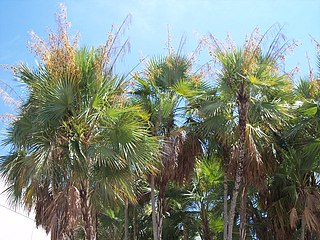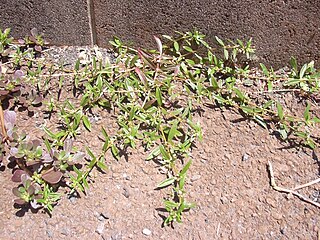Harold Ernest Robinson was an American botanist and entomologist.

The genus Macrocarpaea, with 105 species and two hybrids of 0.5 m herbs, shrubs, epiphytes and small trees to 10 m tall, is the largest genus of the tribe Helieae of the gentian family (Gentianaceae). Species of Macrocarpaea have diurnal and nocturnal pollinators, visited during the day by hummingbirds, insects and butterflies, and at night by bats, moths and many different kinds of insects. The common name for the genus is 'Moon-gentian'. No species are known in cultivation.
Ditta is a genus of plants, under the family Euphorbiaceae first described as a genus in 1861. It is native to the Greater Antilles in the Caribbean.
- Ditta maestrensisBorhidi - Sierra Maestra in SE Cuba
- Ditta myricoidesGriseb. - Cuba, Hispaniola, Puerto Rico

Acoelorraphe is a genus of palms with a single species Acoelorraphe wrightii, known as the Paurotis palm, Everglades palm or Madeira palm in English and cubas, tique, and papta in Spanish. The genus name is sometimes spelt as Acoelorrhaphe or Acoelorhaphe, which are treated by orthographical variants by the International Plant Names Index.

Houstonia (bluet) is a genus of plants in the family Rubiaceae. Many species were formerly classified, along with other genera since segregated elsewhere, in a more inclusive genus Hedyotis.

Oldenlandia is a genus of flowering plants in the family Rubiaceae. It is pantropical in distribution and has about 240 species. The type species for the genus is Oldenlandia corymbosa.
Guettarda longiflora is a species of plant in the family Rubiaceae. It is endemic to Jamaica. It is threatened by habitat loss.
Synapsis ilicifolia is a species of plant in the family Schlegeliaceae. It is endemic to the island of Cuba. It is the sole species in the genus Synapsis, which was described as a genus in 1866.

Epidendrum compressum is a species of flowering plant in the family Orchidaceae . It is from wet montane forests of Trinidad, Venezuela, Colombia, Ecuador, Peru and Bolivia.
Sachsia is a genus of West Indian and Floridian plants in the elecampane tribe within the sunflower family.

Kadua is a genus of flowering plants in the family Rubiaceae. It comprises 29 species, all restricted to Polynesia. Twenty-two of these are endemic to the Hawaiian Islands. Some of the species are common at high elevation. Others are single-island endemics or very rare, and a few are probably extinct. Kadua affinis is widely distributed in Hawaii and is polymorphic. The type species for the genus is Kadua acuminata.
Buddleja cordobensis is a species of flowering plant in the family Scrophulariaceae. It is endemic to dry hillsides in the Argentine provinces of Córdoba, San Luís, and La Rioja at altitudes of 700–1500 m; it was first described and named by Grisebach in 1874.

Arcytophyllum is a genus of flowering plants in the family Rubiaceae. The genus contains 18 species, distributed from New Mexico to Bolivia.
Haenianthusis a genus of flowering plant in the family Oleaceae. It is native to the Greater Antilles of the Caribbean. It contains 3 species:
- Haenianthus incrassatus(Sw.) Griseb. - Jamaica
- Haenianthus salicifoliusGriseb. - Cuba, Hispaniola, Puerto Rico
- Haenianthus variifoliusUrb. - Cuba
Houstonia acerosa, the New Mexico bluet or needleleaf bluet, is a plant species native to Chihuahua, Coahuila, Nuevo León, Tamaulipas, San Luis Potosí, Texas and New Mexico.
Houstonia palmeri, the Saltillo bluet, is a plant species in the family Rubiaceae, native to the Mexican states of Coahuila and Nuevo León.
Ceratopyxis is a monotypic genus of flowering plants in the family Rubiaceae. The genus contains only one species, viz. Ceratopyxis verbenaceae, which is endemic to Cuba. It is a resinous small tree or bush with 4.5-8 centimeter oblong leaves. The fruit it produces is 4-5 millimeters in diameter, and with small hairs attached to the skin.

Spermacoceae is a tribe of flowering plants in the family Rubiaceae and contains about 1346 species in 57 genera. Its representatives are found in the tropics and subtropics.

Leptopetalum is a genus of flowering plants in the family Rubiaceae. The genus is widespread in tropical and subtropical Asia and the Pacific.

Rhynchocorys is a small genus of flowering plants belonging to the family Orobanchaceae. It was formerly classified in the family Scrophulariaceae.










